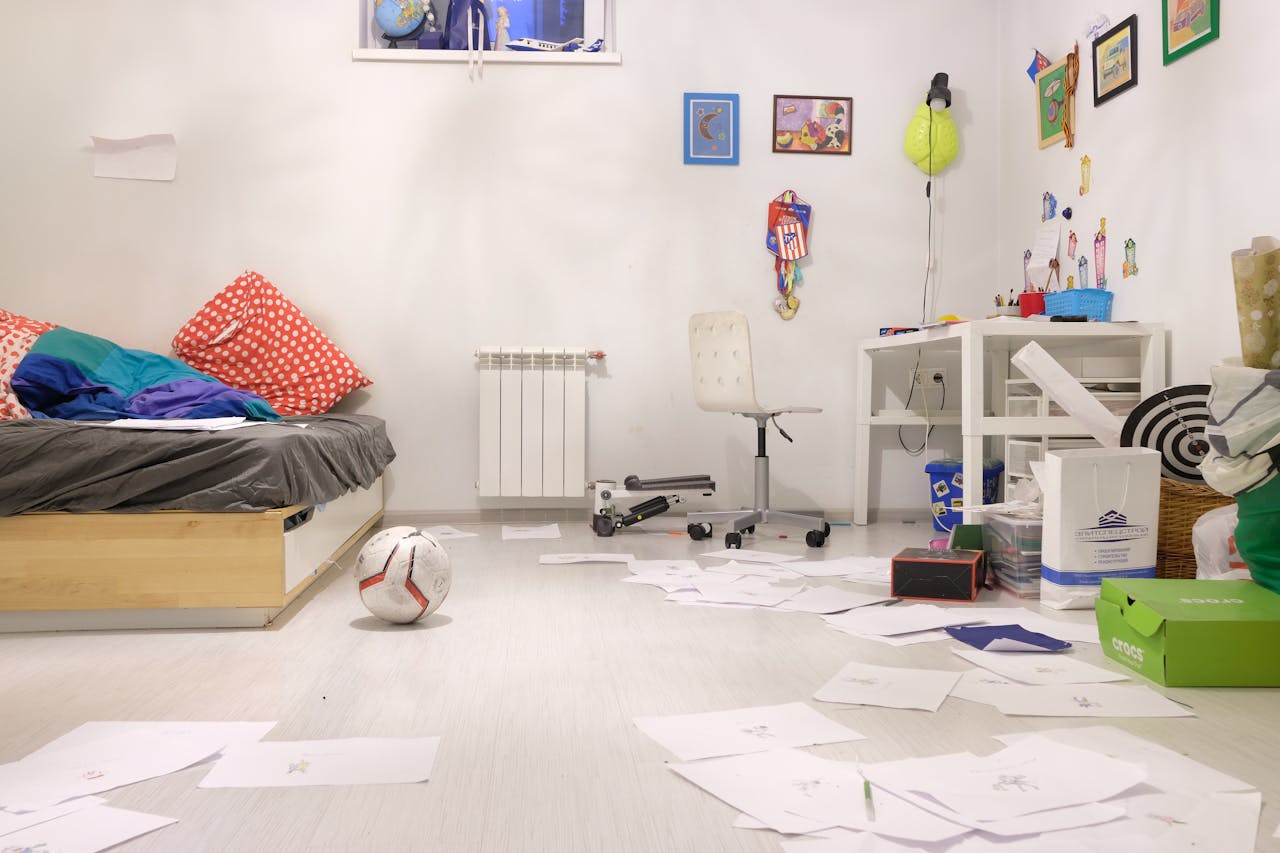Your cart is currently empty!
Reasons Why Highly Intelligent People Have Messy Houses

There’s a common belief that intelligence and tidiness go hand in hand, with the assumption that an organized space reflects an organized mind. Yet, history tells a different story. Some of the greatest thinkers—Albert Einstein, Steve Jobs, and Mark Twain—were known for their cluttered workspaces. Rather than being a sign of laziness or neglect, a messy environment may actually be a reflection of a highly active and innovative mind.
Scientific research and psychological studies suggest that intelligence often comes with a different set of priorities. While some people find clarity in a spotless home, others thrive in creative chaos. This article explores why many highly intelligent individuals seem unbothered by disorder, the science behind their habits, and how messiness can actually fuel innovation.
The Science Behind Intelligence and Messiness

The connection between intelligence and a messy environment isn’t just anecdotal—it has been explored in psychological research. A study conducted by the University of Minnesota found that disorderly surroundings can encourage creativity and innovative thinking. In one experiment, researchers divided participants into two groups: one worked in a tidy room, while the other worked in a cluttered space. Both groups generated ideas, but the participants in the messy room came up with more original and unconventional solutions.
Kathleen Vohs, the lead researcher, noted that while clean environments promote order and socially acceptable behavior, messy spaces inspire people to break free from tradition and explore new ideas. In other words, an untidy setting may help individuals approach problems from unique angles, making it an asset for those in creative or intellectual fields.
However, this doesn’t mean that intelligence and messiness always go together. Some highly intelligent people find structure and organization essential for productivity. The key takeaway is that intelligence manifests in different ways—some minds function best in an orderly environment, while others thrive in chaos.
Reasons Why Highly Intelligent People May Have a Messy Home
While society often equates tidiness with responsibility and discipline, highly intelligent individuals tend to operate by a different set of priorities. Their homes may appear disorganized to the outside world, but beneath the clutter lies a mind preoccupied with bigger questions, creative pursuits, and intellectual challenges. Here’s why intelligence and messiness often go hand in hand:
1. Messiness Can Encourage Creativity and New Ideas

An untidy environment is often a breeding ground for unconventional thinking. Studies suggest that disorder can stimulate the brain by disrupting familiar patterns, pushing individuals to make new connections and generate fresh ideas.
Psychologist Kathleen Vohs’ research supports this notion. When participants in a messy room were asked to brainstorm new uses for everyday objects, they consistently produced more innovative ideas than those in a clean environment. This suggests that a certain level of disorder can foster a mindset that is more open to exploration and non-traditional problem-solving.
Artists, writers, and inventors throughout history have exhibited this trait. Mark Twain, whose writing profoundly shaped American literature, worked at a desk buried under books and papers. Similarly, Steve Jobs, despite his minimalist product designs, was known to work in spaces filled with scattered notes and sketches. Their creative genius flourished in environments that others might have considered chaotic.
2. They Prioritize Mental Stimulation Over Household Order
For highly intelligent individuals, mental engagement takes precedence over routine tasks like cleaning. They are often deeply absorbed in their work, whether it’s conducting research, writing, or problem-solving, leaving little time—or mental bandwidth—for maintaining a spotless home.
Take Albert Einstein, for example. His desk was famously chaotic, yet he revolutionized modern physics. He once quipped, “If a cluttered desk is a sign of a cluttered mind, then what does an empty desk signify?” His words reflect the idea that a preoccupation with intellectual pursuits often overshadows concerns about tidiness.
This tendency isn’t limited to scientists. Renowned author Roald Dahl, whose imaginative stories captivated millions, wrote his books in a shed cluttered with papers, notes, and objects of inspiration. For highly intelligent people, a messy space isn’t a distraction—it’s simply an extension of their thought process.
3. They Challenge Social Norms and Expectations
Highly intelligent individuals often resist conformity, questioning societal norms rather than following them blindly. This independent thinking extends to their personal habits, including how they maintain their living spaces.
For many, the expectation of a neat and orderly home is a social construct rather than a personal necessity. Intelligence often comes with a greater ability to analyze and reject arbitrary rules. If cleanliness is not directly linked to their personal goals or sense of fulfillment, they may not prioritize it.
For instance, innovators like Thomas Edison and Nikola Tesla were known for their unconventional lifestyles. They dedicated their time to intellectual pursuits, largely ignoring societal expectations about orderliness. Their contributions to science and technology far outweighed any perceived shortcomings in housekeeping.
4. They Are Often Deep in Thought and Unaware of Their Surroundings
An active, analytical mind can be both a gift and a distraction. Many highly intelligent individuals get so lost in deep thought that they become oblivious to the physical world around them.
Consider a scientist working on a groundbreaking discovery or a novelist lost in the world of their characters. Their focus is so intense that external details—such as dirty dishes or unfolded laundry—fade into the background. While others may see messiness as neglect, to an intellectual, it is simply an unimportant detail in the grander scheme of things.
This isn’t to say that all intelligent people are messy by nature, but their tendency to become absorbed in their thoughts often makes tidiness a secondary concern.
5. Cleaning Feels Like a Low-Priority or Boring Task

For individuals who thrive on intellectual stimulation, repetitive and mundane tasks like cleaning can feel uninspiring. Their brains crave novelty and challenge, making household chores seem trivial in comparison.
Neuroscientists suggest that people with high IQs often seek out complex mental tasks to stay engaged. For them, spending time on an intricate puzzle, developing new technology, or debating philosophical ideas is far more rewarding than vacuuming or organizing a bookshelf.
However, this does not mean they dislike cleanliness altogether. Many highly intelligent individuals do enjoy a certain level of order—but they prefer to clean sporadically or delegate the task rather than devote daily effort to it. The key distinction is that their motivation for tidiness is functional rather than habitual.
Finding the Balance: Messiness vs. Productivity
While a cluttered space can enhance creativity for some, excessive disorganization can also become a hindrance. Many successful individuals strike a balance—allowing for some level of messiness while ensuring that it does not interfere with productivity or well-being.
For example, Einstein’s desk was famously cluttered, but he still maintained a system within the chaos. Similarly, many professionals adopt the “organized chaos” approach—where a space may appear messy to an outsider, but everything is exactly where they need it to be.
Ultimately, intelligence is not defined by the state of one’s home but by the ability to think critically, solve problems, and create meaningful contributions. Whether an individual thrives in order or disorder depends entirely on their personal cognitive style.
A Cluttered Home, a Brilliant Mind?
Messiness and intelligence have long been linked, but not in the way many might assume. While society often equates cleanliness with discipline and responsibility, research and real-world examples suggest that an unkempt environment can actually encourage creative thinking and problem-solving. Many highly intelligent individuals prioritize intellectual pursuits over routine chores, thrive in unconventional settings, and challenge societal expectations about order.
However, intelligence does not inherently require a messy home, nor does tidiness indicate a lack of intellect. The key takeaway is that different minds function best under different conditions. Some find clarity in organization, while others embrace a bit of disorder to fuel their creativity. The most important factor is whether an individual’s environment enhances or hinders their ability to think, create, and innovate.
Ultimately, intelligence isn’t measured by the state of one’s home but by the ideas, contributions, and impact one makes in the world. Whether surrounded by clutter or in a meticulously organized space, what truly matters is how a person channels their intellect and creativity into meaningful endeavors.
